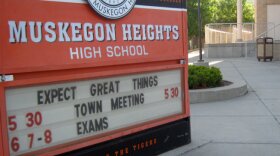Three of the five school districts that face more scrutiny from Michigan’s Department of Treasury have reduced their general fund deficits last school year. That’s according to independent audits recently filed to the state. But some still face serious, ongoing problems. Here’s a breakdown of how the districts ended the 2013-14 school year.
Detroit Public Schools
- Under the control of an emergency manager (previously emergency financial manager) since 2009
- General fund deficit: $169 million – 54% increase over last year
- Major factors in increased deficit: Less federal funding; a decline in student enrollment; money from asset sales didn’t close until after the end of the fiscal year
There is some good news here. Students have fled DPS in droves over the past decade, going from more than 150,000 kids in 2003 to fewer than 50,000 in 2013. The rate of that decline has slowed dramatically in the past two years. Preliminary numbers DPS released this week show it only lost 3.4% of its population this year.
Muskegon Heights Public Schools
- Under the control of an emergency manager since 2012
Muskegon Heights’ school district authorizes a charter school system that replaced the old district. The charter school district is now reporting a deficit of its own.
- General fund deficit: $670,652 – reported no deficit in the general fund last year
- Major factors in increased deficit: slight decline in student enrollment; capital expenditures
The audit for the charter system shows the deficit could have been much worse. The charter school company that ran the district last year was supposed to get paid $1.2 million. But the company and the district agreed to part ways in the spring. The company only received $90,000. The state also offered another emergency loan to Muskegon Heights (the third such loan so far) in the spring worth $1.4 million.
The audit hints at potentially more problems to come. It says the charter academy system is working out “potential cost reductions” because of decreased student enrollment this fall. The district has dealt with a sharp enrollment decline since the emergency manager took over. It’s not clear yet what those reductions will be.
Highland Park Public Schools
- Under the control of an emergency manager since 2012
Like Muskegon Heights, Highland Park’s school district authorizes a charter school system that replaced the old district. The charter school district is now reporting a deficit of its own.
- General fund deficit: $409,545 – 33% decrease from last year
- Major factors in decreased deficit: The charter school company running system waived all of its management fees (worth at least $780,000). Highland Park’s deficit may have improved even more if it weren’t for several other factors, including: higher than anticipated special education costs; legal fees; “downward spiral” in student enrollment; staffing needed to support students who were “grossly behind” academically; and building repairs
Highland Park’s new charter school system has made efforts to cut costs this year. The district closed Highland Park High School, consolidating students in one K-8 building and one 9-12 building. The audit also notes changes to transportation, reduced staff and assessment of special ed students “will help (the system) sustain itself” this school year.
But the audit hints that student enrollment, which was below 500 kids last school year, will be a big problem this year too. “Based on early enrollment data at the start of the 2015 school year, we anticipate that the fall student count will be significantly less than the estimates used in creating the 2015 budget,” the document says.
Pontiac Public Schools
- Operating under a consent agreement with the state since 2013
- General fund deficit: $39 million – a 24% decrease from last year
- Major factors in the decreased deficit: the state offered Pontiac schools a $10 million emergency loan in April
The good news is preliminary enrollment number show the district didn’t lose any more students. In fact, the audit says the district gained 120 students, according to early estimates. The district has a 10-year plan to eliminate its deficit.
Benton Harbor Area Schools
- Operating under a consent agreement with the state since September
- General fund deficit: $15 million – a 2% decrease from last year
Benton Harbor is still working on this year’s budget. It still is working with the state to hammer out the details of this year’s budget. But, the district’s administration anticipates only a modest decline in student enrollment this year.
Curious how your local school district is doing? You can find independent audits here. They were due to the state on November 15. Those that did not file face penalties, like not getting the money the state sends each month.











